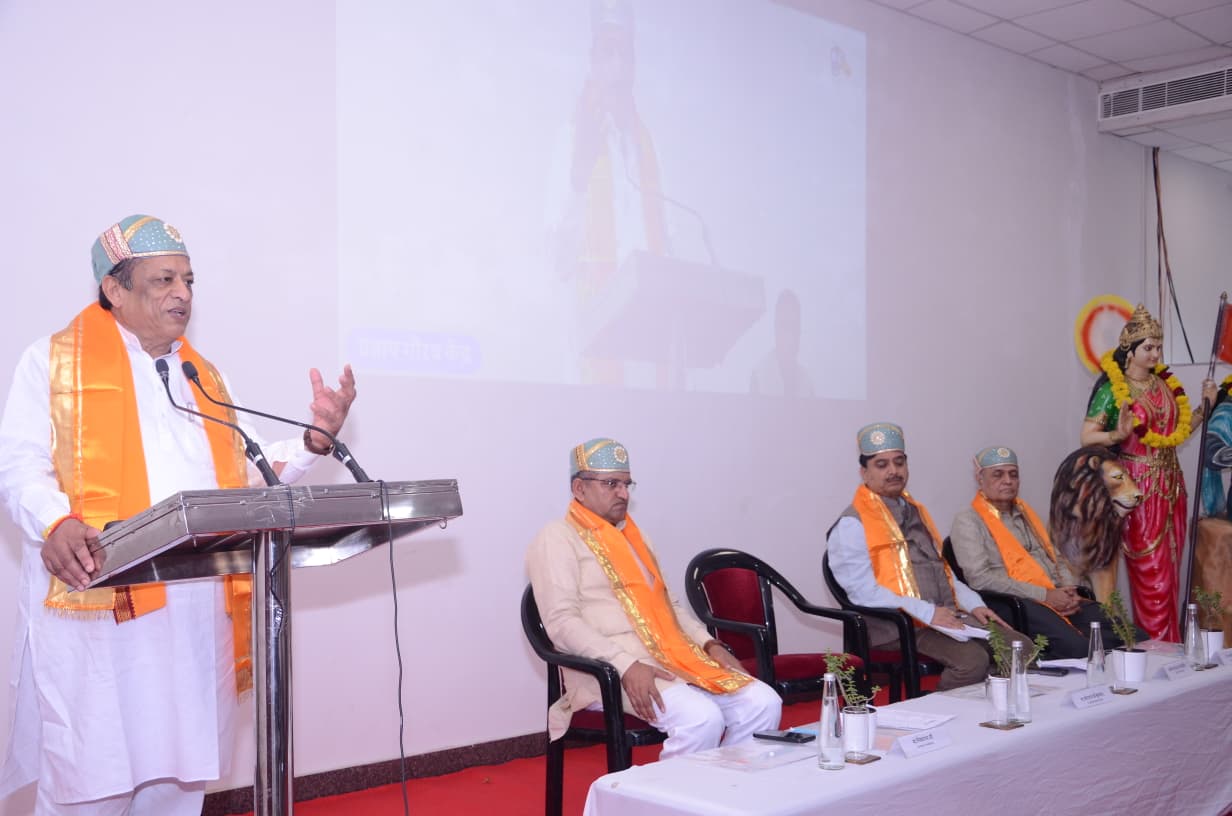####Need to Simplify Indian Time Calculation and Astrology – Nimbarm
Two-day International Symposium Begins at Pratap Gaurav Kendra ‘National Pilgrimage’

Udaipur, Indian time calculation and astrology are completely based on astronomy, geography, and science. There is a pressing need to convey these disciplines to society in a simple and accessible form with a spirit of elevation. For this, a self-determined commitment is essential.
This call was made by RSS Rajasthan Regional Pracharak Nimbarm while addressing the inaugural session as the chief speaker at the two-day International Symposium on Indian Time Calculation, Panchang, and Astrology organized jointly by Pratap Gaurav Kendra and the Devasthan Department. Nimbarm reminded that long before modern instruments, Indian sages and seers—who were essentially researchers—calculated planetary distances and movements. He stressed that though we follow Panchang for wedding muhurats, we still print invitations in English, revealing contradictions in embracing our traditions. He further added that India has its own ancient time scales, predating Gregorian and Hijri calendars, with a legacy of millions of years of calculation that establishes Sanatan culture as the most ancient and refined.
He also highlighted that today’s youth, often criticized as carefree, are in fact leading pilgrimages to Ayodhya, Ujjain, and folk deities’ shrines. “Our weakness lies in not including the scientific depth of time calculation into family traditions,” he observed.
Call for Uniform Ritual Practices
Nimbarm urged scholars to work towards bringing uniformity in ritual practices across different traditions to avoid confusion. He emphasized that India must first rediscover itself, embrace its knowledge systems, and embody them in conduct to realize the dream of “One India, Great India.”
Devasthan Minister on Strengthening Temple Systems
Pointing to the presence of Devasthan Minister Joraram Kumawat, Nimbarm stressed the need to improve the administrative and cultural management of temples. He said priests’ salaries were insufficient and temple systems must be strengthened in line with tradition and culture.
Minister Kumawat, in his address, reiterated that Sanatan culture promotes universal welfare, with its accuracy evident in the pre-decided Kumbh Melas that influence the world. He shared that foreign devotees’ participation in the Maha Kumbh proves its global impact. Referring to the World Yoga Day, he said the world is turning towards Sanatan values. He also underlined the state government’s action against illegal religious conversions, particularly in tribal areas, and initiatives like the Tribal Tourist Circuit that connects Managadh Dham, Matrikundiya, Beneshwar Dham, and Gautameshwar.
Astrology and Mental Health – Prof. Sarangdevot
Chairing the inaugural session, Vice Chancellor of Rajasthan Vidyapeeth, Prof. S.S. Sarangdevot, suggested integrating astrology with mental health and life management. He stated that the cause-and-effect principle operates equally in science and astrology, affirming astrology as a scientific discipline.
Symposium Structure and Sessions
Introducing the theme, Anurag Saxena, Director of Pratap Gaurav Kendra, informed that over two days, sessions would cover topics like astrology, Panchang, time calculation, and heliobiology, with scholars presenting research papers.
On the first day, four sessions were held covering Indian Time Calculation, Panchang, Tithi Calculation and Solar Methods; Planetary Movements and Muhurat; Astrology and Its Impact on Nature and Living Beings; and Heliobiology.
The sessions saw participation from eminent figures including former university vice-chancellors, historians, legal experts, astrologers, and scholars from across the country.
The program was attended by senior officials from the Devasthan Department, including Additional Commissioner Ashok Suthar, Deputy Commissioner Sunil Mattad, Assistant Commissioner Jatin Kumar Gandhi, and Inspector Shivraj Singh Rathore.
साभार :
© CopyRight Pressnote.in | A Avid Web Solutions Venture.






